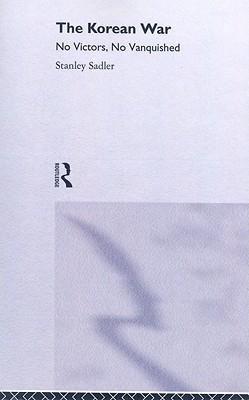

 |

|

The average rating for Korean War: An Interpretative History - Stanley Sandler - Paperback based on 2 reviews is 3 stars.
Review # 1 was written on 2011-07-29 00:00:00 G C Harrison G C HarrisonSandler has a very strong military background. This book is centered around military operation - if not versed in military lingo - you may want to use another source to learn about the "forgotten war." |
Review # 2 was written on 2007-06-04 00:00:00 Jason Summers Jason SummersI know few social environments where the toes are more sensitive than in academic circles. The massive controversy this book has aroused amongst British historians proves it once again. Richard Evans, distinguished professor of history at Cambridge, published it in 1997. It is a bit of a half-hearted attempt to write a new synthesis of where the study of history stands for, thirty years after the classics in that department by E. H. Carr and G.R. Elton. Evans places himself more or less in the middle between those two predecessors, he praises both their strengths but also attacks their weaknesses. That's pretty exciting, but gradually his gaze or better his target shifts in the direction of the postmodernist gulf which according to him has undermined the foundations of the historic business since the 1970s. Evans especially attacks the most radical protagonists Hayden White and Frank Ankersmit on their assertion that reality is only linguistic, only text and discourse, and we never can reach the 'real' reality, in short, that there is no truth and thus all statements are accurate, which comes down to a complete relativism. Evans contends that the practice of historic study proves this is wrong: the truth, the facts of the past indeed are attainable, by applying the correct methodology and when always understood as a preliminary result. " Through the sources we use, and the methods with which we handle them, we can, if we are very careful and thorough, approach a reconstruction of past reality that may be partial and provisional, and certainly will not be objective, but is nevertheless true." I tend to follow Evans in this, but I must admit that his presentation of the postmodernists regularly is very caricatured (although he admits postmodernists also have added valuable new insights), and his statements sometimes are worded rather vaguely. It is therefore not surprising that after the publication of this book (in 1997) Evans drew fiercesome criticism of about the whole historical establishment in Great-Britain and America. In this edition he added an extensive epilogue (70 pages) in which he tries to parry the criticism. This epilogue makes painfully clear how difficult and delicate it remains to define and clearly articulate concepts and views in the study of history. It's a pity so much energy is invested in internal wars between historians and the like. Nevertheless, this is a very interesting read! |
CAN'T FIND WHAT YOU'RE LOOKING FOR? CLICK HERE!!!